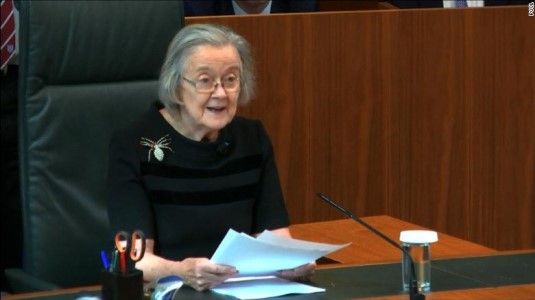Taking Back Control

You didn't need much in the way of legal training to note the government's case before the Supreme Court was tissue thin, and the position led by Lord Pannick on behalf of centrist celebrity much more convincing. All the government could muster was a plea this was none of the court's business, whereas the remainers arranged documentary evidence of the Prime Minister's intentions and cited precedent to bolster their case. Watching proceedings on Thursday, the clincher for me was the bring up of the Unison tribunal fees case. Readers will recall the coalition government of the Tories and LibDems (yes, remember, the LibDems) hiked up fees for employment tribunals. Ostensibly to deter bogus claims and tackle the culture of ambulance chasing, the real reason was to strengthen bullying bosses and tilt the balance of power in the workplace even more in their favour. The Supreme Court found it unlawful on the grounds it went against the spirit of justice by restricting the availability of legal redress. As such, while there were no rules preventing Johnson from proroguing parliament, he was hoping to restrict his accountability to parliament as well as frustrate its normal operation ahead of the Brexit deadline. As such he acted against the spirit of a system in which parliament sits supreme. And the court agreed.
Does this mean the sky has fallen in, like government supporters and Brexiteers claim? Well, only if your present and future schemes are unconstitutional and depend on manoeuvres dodgoir. If you were ever serious about "taking back control" and affirming the superiority of parliament vis a vis the EU, then our leavers should be cheering that the Prime Minister's accountability to it has now entered the corpus of the UK's ludicrous uncodified constitution. So no, the protestations this is undemocratic and places a dead hand on British politics are complete bollocks. If liberal democracy is your bag, then you need bars against arbitrary powers and their exercise. It is also worth noting the court's judgement does not check the power to make laws. There is nothing stopping Johnson from tabling legislation enhancing the powers of the Royal Prerogative, apart from the hilarious disappearance of his majority.
The obvious wider question is if your project for government is transformative, whether the Supreme Court could be used by disgruntled employers and other groups against a programme of the sort unveiled at Labour Party conference this week. And yes, of course it could. If we've learned anything from Labour's own struggle with itself and how the media have systematically defamed and traduced the party and its objectives, every little thing, every avenue to sap our energy and thwart our attempts at remaking the country and redressing the balance of class forces will be leveraged and used repeatedly. You can see it now - cases against Corbynism's disposal of private school property, forcing big pharma to relinquish monopolies on medicine, and the rest. And our strategy in response? It has to be twin track. Observing the constitutional way of doing things, including the proper drafting of legislation that leaves no ambiguities or conflicts with existent and unrepealed legislation. No more half-arsed laws. And the second? Mobilising our movement.
Despite its pretences, while no one is above the law the law itself is the product of contradictory social relationships. The lawyers and solicitors who work in it, and the judges presiding over it neither are nor separate from the rest of society. As privileged and, sometimes, literally bewigged members of the ruling class the law is there for the protection of their property and, obviously, their interests. And we have seen plenty of judgements handed down and precedent set confirming this over the centuries. But, as per the Conservative Party, the existence of the bourgeois interest does not necessarily mean a unanimity around what constitutes that interest. If the state is a general committee for attending to the ruling class's common affairs, the apparatus of the courts is another means for securing it - even if it means one sectional interest of the ruling class loses out. Today's judgement was political whichever way you diced it, and the 11 Justices - of different political persuasions and undoubtedly opinions on the vexed question of Brexit - made a decision they thought was best not just in law, but for the relationship between the courts and conventional politics. And, coincidentally, congenial to the social layer most supportive of the rule of (bourgeois) law: the liberal elite. Only a naïf would suggest these were of no consequence.
Judges are not immune or insensitive to wider politics. As we transform Labour into an actual party/movement as opposed to just being one on paper, we have to mobilise around our policy areas, raise the temperature, make our cases in the workplaces and communities, online and offline, of helping generate an irresistible head of steam for change. If, for example, the country is decidedly cheesed off with big pharma, rip off prescription charges, and how they've exploited the guaranteed market the NHS has provided them for decades, the less likely the law is going to find for them in cases disputing the legality of whatever Labour is compelling them to do. Because, ultimately, the legal profession wants to stay relevant, wants public support, and wants to sustain whatever legitimacy it has in the eyes of the public. A canny Labour government would recognise this, and leverage its support in the country to neutralise mischief, legal or otherwise, before it properly gets going. A reminder then is mobilisation outside of parliament isn't decorative: it is vital and integral to our plan.
Image Credit
Comments
Post a Comment